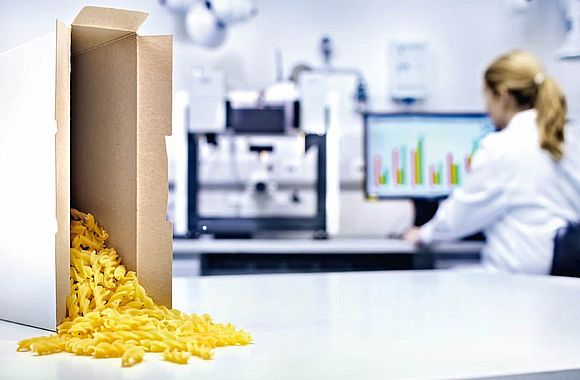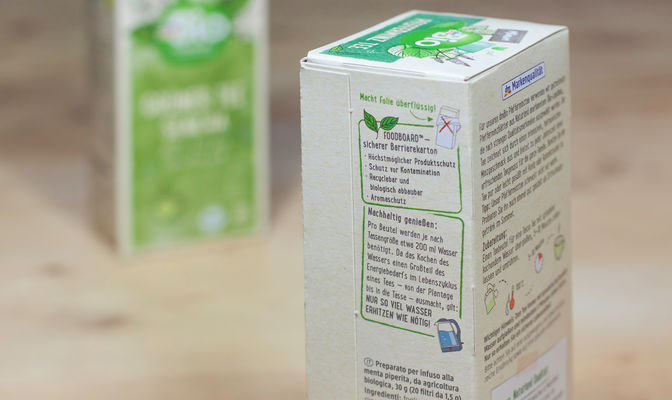FOODBOARD™ Update
05.02.2013 - FOODBOARD™, Barriers
FOODBOARD™, our fully tested solution for the protection of foodstuff against the migration of mineral oils is ready for boarding! In recent months, also the political level has set its course in the direction of a “barrier”.
Legislation is directed towards a functional barrier
After an apparently quiet summer in 2012, an analysis of chocolate in advent calendars in which mineral oil traces and other related substances were found - published by the German consumer association Stiftung Warentest in November - has reignited the debate.
Even though contamination of the chocolate prior to packaging can - in this case - not be excluded as a source, legislative developments indicate clearly that the use of a functional barrier between foodstuff and primary packaging will be necessary in order to deal with mineral oil migration conclusively.
After publication of the results of the advent calendar investigation, the headlines came thick and fast. The children/Christmas/chocolate combination increased the story’s news value and brought a complex subject onto a level accessible even for the mass media. Foodwatch, a German consumer protection organisation which names itself ‘the food saviours’, led the charge against the German Federal Ministry of Food, Agriculture and Consumer Protection (BMELV), accusing the minister of inactivity: Since the beginning of the debate, it was claimed, the minister had not taken the necessary steps in order to prevent results like those highlighted by Stiftung Warentest.
Since then, the topic of mineral oil migration has accelerated - again. The minister issued a press release1 in late November 2012, announcing to the media that the ministry was working on three areas as a matter of urgency:
On the one hand, the Federal Institute for Risk Assessment (BfR) was tasked with validating the analytical methods of measurement used to prove the presence of mineral oil compounds.
On the other, two statutory regulations are intended to solve the problem of mineral oil migration from packaging into foodstuffs: The Printing Ink Regulation stipulates that no inks containing mineral oils may henceforth be employed when printing food packaging, while the Mineral Oil Regulation specifies maximum levels for the migration of mineral oil from food packaging into foodstuffs. The Federal Office for Agriculture and Food (BLE) considers a functional barrier to protect food from unintended substances to be „indispensable“, and has recommended such a barrier to the BMELV as a decision guidance in its final report for the year 2012: „Extent of migration of printing ink components from packaging materials into foodstuffs“.
A barrier solution to keep unintended substances out of foodstuffs has also been advocated in Austria, by the Codex Commission. A corresponding recommendation was published by the Federal Ministry of Health (BMG) in December 2012. Increasing interest on a national level is leading to increased political pressure to introduce clear regulations in order to take today’s uncertainty out of the market.
Since the mineral oil issue has become known, Mayr-Melnhof Karton’s team of experts has been working closely with the relevant legislative bodies, playing a leading role in the search for a solution achieving maximum consumer protection.
With FOODBOARDTM, a new recycling paper based board with an innovative barrier applied on the food contact side of the board, MMK has developed a barrier against mineral oils, which prevents migration into foodstuff.
Homologation of FOODBOARD™
In the past twelve months, Mayr-Melnhof Karton has put its focus on the homologation of FOODBOARDTM: In close cooperation with more than ten international consumer goods producers, long-term real life tests were carried out in the most diverse product categories. In these tests, FOODBOARDTM was processed into folding cartons using standard production procedures (printing, die cutting, finishing, gluing). With over 2 million FOODBOARDTM based folding boxes having been tested to date, we can confirm that the established procedures of the converter and consumer goods producer will not need to change. In the test procedure, the folding cartons were filled at standard machine speeds directly on the consumer goods producer’s packaging lines and packed onto pallets. Following a transportation test, the food packages were stored under controlled worst-case conditions in specially acquired climate chambers for a year. Analyses in the foodstuffs were carried out every 3 months. Besides mineral oils, also other defined unintended substances such as DIPN were analysed.

The result: FOODBOARDTM protects foodstuffs against the migration of unintended substances!
All our results prove conclusively that with the use of FOODBOARD™, food packaging is in full compliance with the expected “mineral oil regulation”. But there is more: In addition to the good analytical results, FOODBOARDTM demonstrated its strength on the packaging line. Its special fibre structure gives this new recycling cartonboard grade a perfect “runnability”. All homologation tests have therefore been a complete success! All the tests saw the current benchmark grade tested as a reference. The results were as expected: Mineral oil analyses have found significant cross-contamination from environment and secondary or corrugated board in packaging made out of virgin fibre as well as recycled fibre board as a possible source of mineral oil migration. Today’s standard cartons made out of virgin fibre as well as recycled fibres thus failed in the test scenarios. Only a functional barrier can stop migration and will make it possible to meet the future statutory limits being discussed.
Overwhelming interest
Apart from the world’s largest producers of consumer goods, MMK is also being contacted by a great number of retailers for more detailed information on the FOODBOARDTM solution. These discussions are conducted with great care; the entire supply chain is briefed on the current legal situation concerning materials in contact with food products and updated on the status of the FOODBOARDTM solution. Potential FOODBOARDTM customers are now calling for the next step to be taken: Investment in the rebuild of a cartonboard machine, in order to gain a competitive advantage in their given product category before the statutory regulation comes into force. Mayr-Melnhof Karton is committed to its current strategy: Based on the “standard legal procedure”, FOODBOARDTM will be available before execution of a “mineral oil based ordinance”.
By the way: Stiftung Warentest’s conclusion, that the mineral oil concentrations discovered in the advent calendars came from recycled cartonboard, have proved unsound. Out of 24 advent calendars analysed, 23 were made out of virgin fibre board.
What is Cross-Contamination?
One possible source of mineral oil migration is cross-contamination. During storage and transportation, migration of unintended substances can occur from the environment and the secondary or corrugated board packaging to the packaged food product. Investigations by the Cantonal Laboratory Zurich as well as internal measurements by MM Karton confirm this risk.
Mineral oil migration therefore cannot be prevented by the use of standard folding cartons of virgin fibre cartonboard, or standard plastic packaging.
MOAH analyses (mineral oil aromatic hydrocarbons) have found significant cross-contamination from environment and secondary or corrugated board in packaging made out of virgin fibre as well as recycled fibre board as a possible source of mineral oil migration. Only a functional barrier between the foodstuff and the
environment represents an effective solution.
This is emphasised by the BMELV’s press release of November 29th 2012: ‘By the use of packaging with barrier effects (inner bags or inner coatings), mineral oil migration can be extensively prevented.’ Only a functional barrier will guarantee protection against migration.
For further information, please contact our team of experts:
FOODBOARD@mm-karton.com
Interested? Datasheet and Samples of
FOODBOARD™ can be found here:

![[Translate to English:] [Translate to English:]](/fileadmin/_processed_/9/4/csm_4_Gewinner_7ba52790a9.jpg)
